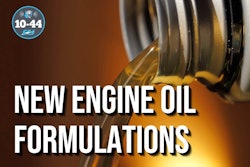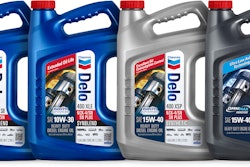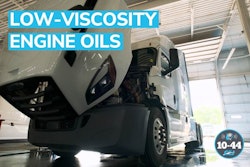Just 10-15 years ago, your tractor was probably factory filled with a 15 weight conventional oil, so all your A and B service intervals were built around that and your oil changes were probably with the same factory fills. Over the years those factory fills and OEM recommendations have changed and not all fleets have kept up.
Contents of this video
00:00 10-44 intro
00:28 Changes in OEM recommendations
01:12 Synthetic blend vs. conventional engine oil
02:21 Synthetic blends and full synthetics
03:28 Older equipment
06:36 Lightweight engine oil and power
09:21 Emissions regulations and changes to engine oil
Jason Cannon (00:00):
CCJ's 10-44 is brought to you by Chevron Delo heavy duty diesel engine oil. Now there's even more reasons to choose Delo.
(00:09):
Trucking is a legacy driven business, but are some of your best practices out of date? You're watching CCJ's 10-44, a weekly webisode that brings you the latest trucking industry news and updates from the editors of CCJ. Don't forget to subscribe and hit the bell for notifications so you'll never miss an installment of 10-44.
(00:29):
Hey everybody, welcome back. I'm Jason Cannon, and my co-host on the other side is Matt Cole. A lot of people get into transportation because a family member was in the business and a lot of maintenance best practices today are still in place because they were best practices 20 or whatever years ago. But times and things change and processes often don't keep up.
Matt Cole (00:48):
10 to 15 years ago, your tractor was probably factory filled with a 15 weight conventional oil, so all your A and B service intervals were built around that, and your oil changes were probably with the same factory fills.
Jason Cannon (00:59):
Over the years, those factory fills and OEM recommendations have changed, and while some fleets have kept up with the times, Walt Collier, America's brand manager for Delo engine oils says that's not the case for everybody.
Walt Collier (01:12):
Most, and I do mean most, Jason, of the OEMs in North America today fill with the 10W30 versus a 1540. And in some cases now it's really a syn blend versus a conventional, and they have been doing so since about 2013 when they started with CJ4, when OEMs moved to CJ4. And then when it moved over to CK4 and FA4, you started to see more companies move from conventional to a syn blend. So fully synthetic and synthetic blend oils offer better stability than conventional oils and improve their performance in varied weather conditions. By rule of thumb, you want to always follow the recommendation of the OEM manual first.
(01:59):
But let me start with this today, most all on highway heavy duty truck OEM factory fill with either a CK4 10W30, or a FA4 5W30, or 10W30. And that is why it's important to check with your OEM for specific information for their diesel engines. And that is important. But I'd also like to explain that there are two different types of oils, of synthetic oil, and that's synthetic blend and full synthetics.
(02:31):
A synthetic blend oil is a mixture of conventional oil in a synthetic base stock. A full synthetic oil uses a synthetic base stock mixed with a variety of additives to boost the performance of the oil. So preventative maintenance expenses are increasing basically as more OEMs require the use of more expensive synthetic oil for new models. But then it comes into your part about the older equipment, right? But it really doesn't matter, like new or old, these oils now are reverse compatible. But anytime you spend money on a synthetic oil, it typically costs as much as 60% more than traditional mineral based oils that are retired. So whether it's for fleet services, company-owned or even owner-operators, 70% of all of the new highway heavy duty engines are required by the OEMs to use either a syn blend or full synthetic heavy duty oil.
Matt Cole (03:29):
Convincing fleet owners operating older equipment to make that change though, Walt says is challenging,
Walt Collier (03:34):
One reason OEMs started to adopt assemblies of synthetic motor oil was to increase the fuel economy, especially when moving from a 1540 to a 10W30. Over the years, studies have shown that synthetic lubricants when compared to conventional lubricants, are able to maintain a better viscosity during severe operating conditions, which ultimately increase engine components. But the tests have also shown when compared to conventional oils that full synthetics function better in extreme hot weather. Right?
(04:06):
So the trend to lower viscosity oil begin decades ago, right, and the Society of Automotive Engineers has a numerical code that pretty much helps with the grading stage of that, and the temperature range is denoted by SAE grade. So when a customer or a driver is looking and selecting heavy duty engine oil, they should make sure that they follow four things. And that's one, follow the OEM recommendation. Two, consider the operating conditions. Three, compare synthetic versus non-synthetic. And four, don't be afraid to seek out expert lubricant advice from your lubricants provider.
Jason Cannon (04:47):
One of the things I hear often about lighter weight engine oil is how thick conventional oil makes better power. But Walt says that's not necessarily true. He tells us more after a word from 1044 sponsor, Chevron lubricants.
Sponsor (05:00):
These past few years have been less than easy. We've encountered challenges we never imagined we'd ever have to deal with, from makeshift home offices and video meetings to global supply chain uncertainty, price instability, market disruptions, and everything in between. Delivering the level of services and products our customers had come to expect was difficult for all of us. We can't change what's behind us, but we can definitely learn from it. We can adapt, evolve, and take steps to reset our thinking, adapt our strategies, and restore your trust in us to better meet your needs, now and in the future.
(05:40):
That change begins today. Today we break with convention and introduce a rebalance line of Delo heavy duty engine oils. We've reduced our product line from four categories to two. Consolidated and simplified, this lineup removes complexity from the manufacturing processes, enhancing price stability, and supply chain reliability so you can trust you'll have the premium products you need to keep your business always moving forward.
(06:12):
Our break with convention optimizes the Delo lineup to allow you to provide your customers with the best synthetic blend and synthetic heavy duty engine oils in the market, fully available at prices you can rely on. It's your assurance that you'll be well-positioned to be their trusted source for proven engine protection that keeps equipment on the job, giving your customers even more reasons to choose Delo.
Walt Collier (06:39):
That's absolutely right. There is no recommendation that says it has to be conventional. Now, in today's world, we see situations where drivers come up now, owner-operators in particular that say, "Hey, I'm running a thin oil. It doesn't power the way that it needs to power." And we try to tell people that it's not how thin oil is when it comes to power. It's all about the environment and operating conditions of the engine that has to do with it.
(07:10):
So if you think about cold conditions, for example. If the oil is high in viscosity, it may resist movement and delay the lubricant from the vital engine components, which can result in increased engine wear. So in these conditions, lower viscosity engine oils such as the 5W40 or 0W40 are more suitable as they allow the oil to flow better at lower ambient temperatures.
(07:36):
For fleets operating in warmer regions, especially in the south, right, a multi-grade heavy duty lubricant with the viscosity SAE of 10W30 or 1540 may be more suitable. These oil grades resist the breakdown associated with higher temperature to allow adequate flow and lubrication of critical engine components.
Matt Cole (07:57):
Just like everything else, engine oil optimization is all about balance and how it's best suited to your operation and your fuel efficiency, equipment life targets, and maintenance goals.
Walt Collier (08:07):
Full synthetic and synthetic blend oils offer better stability, right, than conventional oils to improve performance in the varied weather conditions. But synthetic blends can enhance engine protection and performance in certain operating conditions.
(08:21):
So to your point, yes, I think it depends on where you are in the world or the part of the United States. If you are in a colder climate and the oil viscosity is too high, it may resist the movement, and so you might want to go with a lower viscosity oil like a 5W40 or a 0W40. But that's extremely cold condition. But when you think about the south and trying to get to that optimal temperature because it's so warm, then customers or drivers are looking at the 10W30 for fuel economy benefits. But then some of the older equipment, you still have 70% of the market that's looking at the 1540 because they believe that that's where they need to be. But 10W30 is perfectly fine to you. So I would just say to that, it depends on where you are in the world, but synthetic glands can offer enhanced engine protection and performance in certain operating conditions.
Jason Cannon (09:21):
We're about to undergo the second evolution of an engine oil formulation in roughly a decade, and most of it's driven by emissions regulations. But why do emissions regulations prompt changes to engine oil when the fuel that's actually combusting in the engine doesn't undergo those same changes?
Walt Collier (09:38):
Let me tell you, Jason, that's a great question and that's a question that we get a lot, and that's a question that we see a lot in the industry. Diesel engine is the main power of on-road transportation and non-road mobile machinery. But to curb diesel emissions, the industry has employed exhaust gas recirculation, EGR, selective catalytic reduction, SR, and diesel particular filters, DPFs, as well as engine designed modifications lowering NOx emissions.
(10:10):
So when you ask with the emission changes, "They don't change the fuel. Why don't they change the oil?" The answer is because these frequent industry emission changes, fuel alone can't reduce, or they can't reduce emission reduction. You must modify the engine to reduce emissions, and those changes require different oil types. Oil companies must adapt to meet the specification of these engines to meet these industry requirements. We've seen OEMs ask for reduction in sulfated ash with CJ4 down to 1%. And now with PC12 coming, it will be down to 0.9%.
(10:48):
And that is why we've created a product like DELO 600, and that's why it's so important, especially when you consider these regulatory changes. Our product is ahead of the game. And in our Delo 680 ADF, Chevron has created a heavy duty engine oil that was specifically designed to fight DPF ash clogging. This product cuts sulfated ash by 60%, reducing the rate of the DPF clogging and extending the life of the DPF by two and a half times. Delo 600 is a new dimension in fuel economy improvement because it reduces fuel consumption by up to 3% over the life of the system. So we're talking less ash accumulation, lower back pressure and less frequent regeneration and improved fuel economy. And it doesn't stop there. If you have a mixed fleet of diesel and CNG engines, then this product DELO 600 ADF can also be used in compressed natural gas engines.
(11:49):
This revolutionary technology has set us apart from the competition by offering an unmatched value proposition for customers with modern low emission engine technology, and Chevron leads to industry and research and development on low ash diesel engine technology for over a decade. So we see the frustrations that owner-operators and fleet customers have when it comes to regulatory changes, but at Chevron, we're ahead of the curve. We've successfully gone further with the DELO 680 ADF to offer substantial emission control system benefits without any compromise to engine protection.
Jason Cannon (12:27):
That's it for this week's 10-44. You can read more on ccjdigital.com. While you're there, sign up for our newsletter and stay up to date on the latest in trucking industry news and trends. If you have any questions or feedback, please let us know in the comments below. Don't forget to subscribe and hit the bell for notifications so you can catch us again next week.











